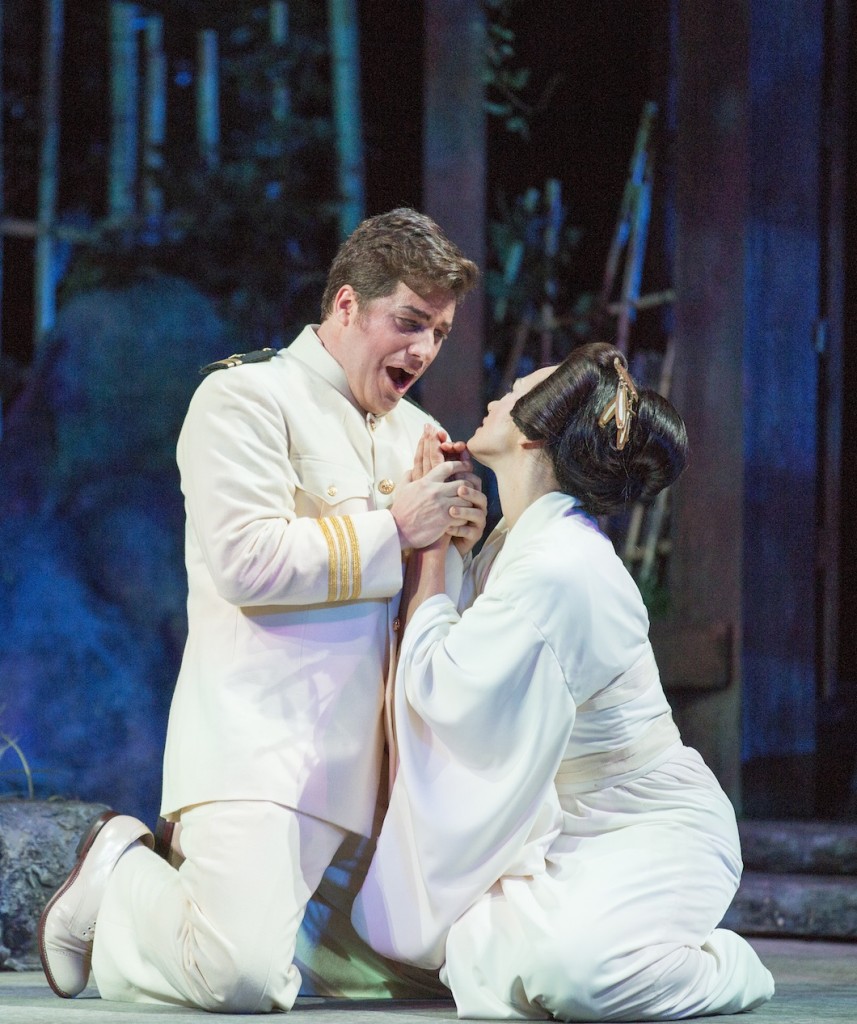FGO opens season with a compelling and spectacular “Butterfly”

Kelly Kaduce and Martin Nusspaumer in Puccini’s “Madama Butterfly” at Florida Grand Opera. Photo: Rod Millington
Florida Grand Opera has taken on Giacomo Puccini’s 1904 masterpiece Madama Butterfly to open its 74th season, one of the most beloved and performed of all operas. FGO has presented the work twelve times, and their current Butterfly, which opened Saturday at the Adrienne Arsht Center, is indeed grand, a sure-fire, compellingly realistic production.
Conductor Ramón Tebar’s brisk opening tempo set the pace for the orchestra’s superb performance, marked by precision, balance and deep expression. Now in his fourth season with FGO, Tebar’s sensitive, skillful leadership never overpowered the cast, and some extra-long lines and grand pauses added tension to the opera’s most effective moments.
In director Marc Astafan’s realistic, detailed staging, everything is in motion from the start, a visual feast from the pageantry of Butterfly’s marriage entourage to the symbolic poignancy of a toy boat at the end. Astafan’s choices drive the story continuously and imaginatively, and the treacherously long swathes of orchestral music seem natural, never awkward, as with the “Humming Chorus,” which links the two sections of Act II, as Butterfly waits patiently for Pinkerton to arrive.
Butterfly’s fate is clearly sealed from the opening moments of the opera, but Astafan and soprano Kelly Kaduce make her a character that we root for continuously until the final tragedy. It’s easy to identify with Kaduce’s charmingly nuanced teenage Butterfly. By turns, fiery, impetuous, lithe, and lovely, she is an open book, eager to please and embracing everything American, only reserved when she remembers herself.
Initially, Kaduce’s voice comes on a bit strong, but over the evening, she proves repeatedly that her voice and emotional range are well suited for the demanding role. By the end of Act I, Kaduce is in full force, flowing beautifully between youthful and womanly, loud and soft, and well matched to tenor Martin Nusspaumer’s virile Lieutenant Pinkerton. Kaduce’s coquettish revelations afford brief but intense glimpses of Butterfly’s complete devotion to Pinkerton, portending her renunciation on several levels. In the opera’s most famous aria, “Un bel di,” Kaduce doesn’t disappoint. As Butterfly’s long-held fantasy unfolds, Kaduce wrings out incredible emotional impact, unleashing Butterfly’s true vulnerable heart to powerful effect.
Nusspaumer’s tenor is more than big enough to fill Pickerton’s shoes. His effortless high notes and full, mature color make him a heartbreaking lead. Pinkerton, like so many young men, arrogantly lives in the moment without regard for the future. Often he is characterized simply as an irredeemable cad, but Nusspaumer maximizes any likability that Puccini embeds in the character. In “Dovunque al mondo,” Nusspaumer’s attractive, fit, patriotic Pinkerton is appealing, his shallowness minimized by his youth.
In a terrifying showdown with Butterfly’s uncle The Bonze, played commandingly by bass Jeffrey Beruan, we know that Pinkerton is marking his territory more than defending Butterfly. And yet, Nusspaumer conveys tender infatuation, making us believe that he truly falls in love with her. The unequal emotional dynamic between the two intensifies over the trajectory of Act I’s long duet, as the chemistry between Nusspaumer and Kaduce becomes more palpable.
As the U.S. consul, Sharpless, baritone Todd Thomas radiates authority and wisdom, making an excellent foil for Nusspaumer both dramatically and vocally. From Pinkerton and Sharpless’s light banter in the opening moments to the deadly serious scene near the end, Thomas’s vocal beauty and empathy reveal a good man in a bad position. His tender delivery of bad news anchors the heartbreaking central scenes.
As Butterfly’s faithful servant, mezzo-soprano Caitlin McKechney made a likable Suzuki. Contemptuous of Pinkerton, her anguished “E Izaghi ed Izanami” set the mood for Act II, over Tebar’s expertly carved orchestral lines. Despite a distinctive darkness, McKechney’s voice is not as strong as the other principals, but she rose to the occasion in the Flower Duet, bolstering Butterfly’s ecstatic triumph and garnering spontaneous applause.
Among the biggest stars of the evening was the beautiful production. David P. Gordon’s set, borrowed from Sarasota Opera, offered a tiled roof over a complete wood and paper house, a full garden of trees and bamboo and Japanese screens. The cherry blossoms and a tattered flag forlornly mark the passage of time. Allen Charles Klein’s splendid costumes delighted the senses in rich pinks, corals, lavenders, and aquas. The spectacular lighting design by Kenneth Yunker included stars in the sky and fireflies evoking magic.
FGO has mined their Young Artist program for most of the supporting roles, including the opportunistic marriage broker Goro, played convincingly by tenor Daniel Bates, and Kate Pinkerton, played regally by light soprano Hailey Clark. Bass-baritone Chance Eakin as the Imperial Commissioner and baritone Isaac Bray as the Official Registrar made strong debuts, but in the more substantial role of Prince Yamadori, baritone Will Hughes lacked necessary power.
Chorusmaster Michael Sakir’s strong ensemble of Butterfly’s relatives provides exquisitely floating melodies from offstage for a sense of distance, and visual delight onstage. Their judgment of Butterfly is surprised and woeful rather than harshly condemning.
As Butterfly’s three-year old son, Sebastian Powell is a natural gem, reacting beautifully to Kaduce and McKechney, scattering petals and waving an American flag adorably.
Madama Butterfly continues through November 22 at the Arsht Center and December 4 and 6 at the Broward Center for the Performing Arts in Fort Lauderdale. Vanessa Isiguen sings the role of Butterfly Nov. 16, 21 and Dec. 6 and John Pickle sings Pinkerton Nov. 16, 18 and 21. fgo.org; 800-741-1010.
Posted in Performances
Leave a Comment
Sun Nov 16, 2014
at 1:26 pm
No Comments






